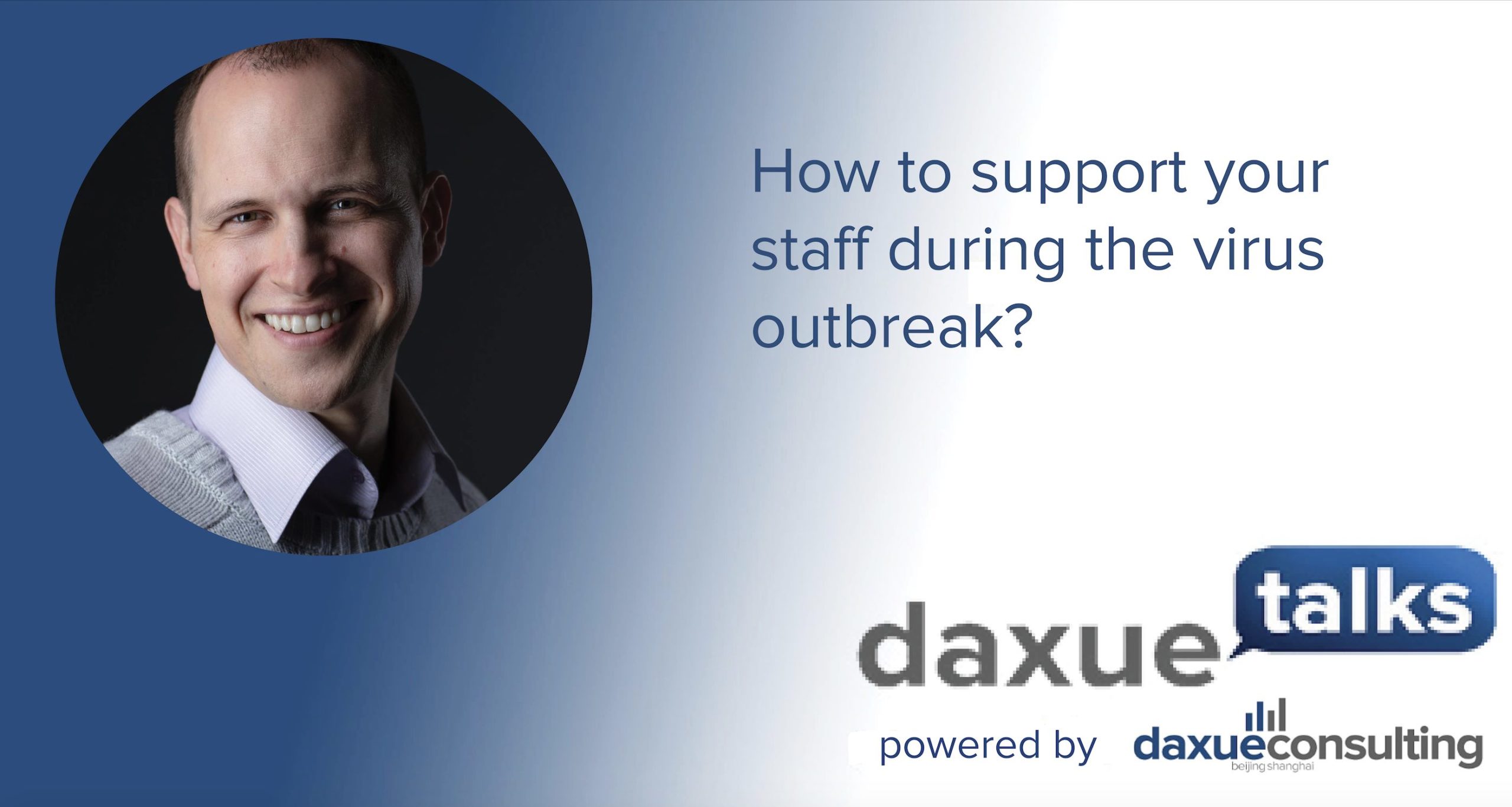Support your staff during the virus outbreak
In this episode of Daxue Talks David Ammerschlaeger, a psychologist and the head of psychology at ChingHo clinic, answers to the question of how to support staff during the virus outbreak.
Full transcript below:
Welcome to Daxue Talks, a show powered by Daxue Consulting, a China-based strategic market research company founded in 2010.
My name is David Ammerschlaeger, I am a psychologist and I am the head of psychology at ChingHo clinic. I am also an executive coach and a member of the shanghai international mental health association and the British psychological society and I am very happy to be here tonight.
How can employers support their teams working in virtual teams?
So, I see three ways that companies can deploy to support their teams. Firstly, they can train people to actually work in virtual teams. Normally in many larger companies, this is something many people have already experienced to a certain extent. We have companies in the United States, in Europe for example who have experience with that and have programs and collaborations with psychologists for employees doing teamwork. And psychological services can be done in this case and the concern mainly is around feelings of isolation, loneliness and managing burnout. So, the training addresses typically self-management, engagement and motivation and communication and different project management techniques also to work effectively alone.
For example in my clinic, at ChingHo clinic we have developed several programs with our physicians and traditional Chinese medicine doctors to develop training that is online and on site for people who have issues during this time staying at home and working from home and to help them actually leading a healthy life from a mental point of view and from a physical point of view.
Secondly, companies can support their staff mentally, so it seems for example that many people have issues organizing their time and prioritizing, focusing on tasks and so on. So, for them, it’s a big challenge as well when they’re not used to take this kind of responsibility for themselves. So, this brings again more anxiety, stress and pressure and on the other side we have managers that have to rely more on actual results to assess whether people have been working well or not, and that can typically lead to mutual frustration and stress.
So, for managers, it might mean taking in more coaching stance for example or building up mutual trust and sincerity and that actually might seem paradoxical in a situation where the manager and his team are physically more distant. So that means on a human level we need to be closer to your teams, while physically you’re more distanced than usual when you’re working together at the office, which can be a little bit difficult for some people.
Thirdly employers have to give their staff the means to perform in their work and to live in a healthy way and to actually be able to perform I would say. So that means mainly defining clear goals for the employees and targets and it also means that employers have to define the clear limitations of the workers’ independence. So, for example – a clear decision-making model might be necessary because of the physical distance, the worker can’t rely on his manager for taking all the decisions. So, more independence means that roles and responsibilities need to be more clearly defined and managers cannot micromanage their employees from a distance. Otherwise its unbearable for both the managers and the employees. So they have also to learn to manage their own feelings of distress insecurity and that’s a big challenge sometimes from what I have seen – I don’t know in China, but it’s also true for other countries because many managers want to be reassured by their team members that actually their team members are able to handle the thing and that means that they have to relinquish part of the control and well – work on themselves basically to have enough trust and the feeling of confidence and security in their teams to let them work on their own.
Have you come across interesting examples of how employers support their teams to avoid psychological stress during the virus outbreak?
Yeah, a very good example, for example, is a company engaging in what is called an employee assistance program, so that is an EAP. EAP provides help, support and counseling for employees and their family members when they are faced with mental health and emotional issues. That means that any employee who feels the need, can require the intervention of an external psychologist, mental health professional to help them in dealing with their hardship and I myself collaborated with several companies to provide EAP services and I would say the problems that we are working with are absolutely diverse. It can be overwhelming, burnout, depression, anxiety, conflict management but it can be also actually a love relationship at the office or actually sometimes even tougher issues like harassment or other things. Anything is possible. And it’s very commonplace in the United States and in Europe so according to the American employee assistance professional association, in the United States over 97% of companies with more than 5000 employees have an EAP and 80% of companies with 1000 – 5000 employees have an EAP and for the smaller companies, 75% of the companies have such a program. That’s absolutely huge and this is something that I do not see in China happening, I think this is something that really China can probably make huge progress and is investing as well right now and working with companies on that kind of project, but it’s always foreign multi-national companies. I have not yet seen Chinese companies, okay I don’t speak Mandarin so maybe that’s the limitation, but in my knowledge, I think there are very, very few Chinese companies that have engaged in such employee assistance programs.
Research has actually shown that EAP’s are effective, but the problem here is that it has to be a fully confidential process between the employee and the psychologist and that’s one of the things that has been tagged out. Whenever there is this lack of trust, I would say there’s a problem because the relationship between the psychologist and the employee is problematic and then you have not this – what we call if you have a critical relationship which is the intense exchange of the depth of the analysis that can happen.
But it shows that by caring for the employee, the company is not always increasing his well-being and the performance but it is also increasing the employee’s loyalty and satisfaction to work within this company. So, it shows that the company actually takes care of its employees, supports then that personal life and their mental health and personal well-being. So, it builds trust and collaboration for the future and I’ve seen that a lot of employees who have gone through an EAP program also tend to stay longer within the company.
Any questions? We will find an expert to answer them. Drop your questions in the comments or send us an email – dx@daxueconsulting.com.





